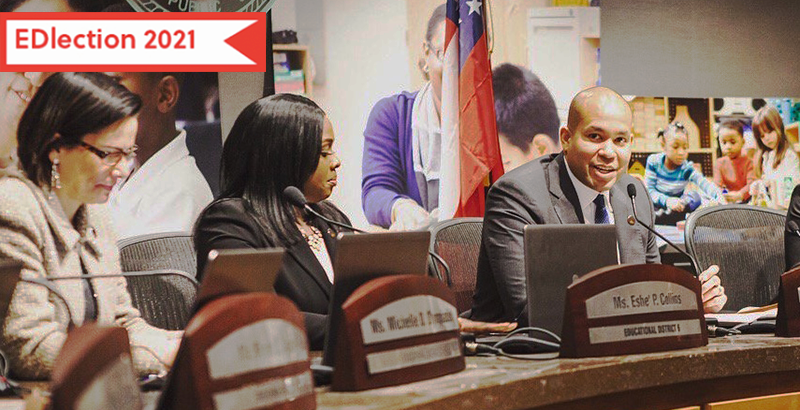Atlanta Voters Choose 5 Incumbent School Board Members as Concern Persists Over District’s ‘Deep Inequities’

Get stories like this delivered straight to your inbox. Sign up for The 74 Newsletter
Updated December 1
In Tuesday’s runoff to fill two remaining seats on the Atlanta school board, unofficial results show incumbent Aretta Baldon, who has the backing of organizations advocating for the city’s Black and low-income students, barely held on to her seat representing District 2. She received 50.7 percent of the vote, while businesswoman and former Atlanta Public Schools student Keisha Carey earned 49.3 percent.
Meanwhile, with over two-thirds of the vote, newcomer Tamara Jones, an urban planner, defeated opponent KaCey Venning in a race for the at-large District 7 seat. The incumbent did not seek re-election.
All nine seats on the board were up for a vote in this election cycle. But because of a new state law staggering the terms, Jones, and the others holding odd-numbered seats, will serve two years before running again in 2023 for full four-year terms.
Responding to questions from a civic organization, Baldon emphasized her work to reduce the racial achievement gap, distribute resources more equitably across the district and open remote learning centers during school closures. Jones said she will prioritize improving literacy instruction and said it’s important for the district to work closely with city and county officials to increase wraparound services for students and lower student mobility rates.
Five incumbents, including one who ran unopposed, appear poised to continue their terms on Atlanta’s school board following Tuesday’s election. Unofficial results show two newcomers — Katie Howard and Jennifer McDonald — will join them, but two other remaining races will be decided later this month in a Nov. 30 runoff.
In that election, incumbent Aretta Baldon, who was leading with 48 percent of the vote, will face challenger Keisha Carey. Tamara Jones, an urban planner, and KaCey Venning, an education and mental health advocate, are also headed to a runoff.
The election comes at a time when Atlanta’s population is growing more white and affluent, spurred in part by growth of the city’s tech sector. Overall, student achievement has improved in recent years, but advocacy organizations seized upon the election to raise awareness that many Black and Hispanic students aren’t sharing in that success.
Unofficial results show incumbents Cynthina Briscoe Brown, Eshé Collins, current Chair Jason Esteves, Erika Mitchell and Michelle Olympiadis will hold on to their seats — a clear sign that voters are mostly satisfied with who’s running the district, said Anthony Wilson, executive director of Equity in Education, an advocacy organization that trained over 20 candidates for the board.The district’s all-time high graduation rate of 80.3 percent likely has something to do with that, Wilson said. While he said he’s proud of the district’s progress, “I’m also concerned about the deep inequities that persist across our city’s schools.”
The group endorsed candidates for seven of the nine seats on the board, including Baldon, Collins, Esteves, Howard, Mitchell and Venning. They also backed Keedar Whittle, who runs an education staffing agency, but was unsuccessful in his effort to oust incumbent Brown for an at-large seat on the board. Brown, an attorney, was leading with over 70 percent of the vote.
Regardless of the outcome in the two runoff races, the board leading the majority Black and Hispanic district will have at least three new members. Some candidates saw significant overlap between issues facing the city and the district. Venning, for example, mentors young Black boys, many of whom support their families by selling water at intersections and freeway off-ramps. She leads a nonprofit to connect them with members of the business community and other youth employment programs. Across the city, some of the “water boys,” as they have become known, have been involved in violent incidents, contributing to concerns about rising crime — a major issue in the mayor’s race.
The election has energized groups focused on holding the 51,000-student district accountable for schools where most students score well below grade level. Equity in Education wants to see more wraparound services for students, integration efforts, and alternatives to suspensions and expulsions.
The Latino Association for Parents of Public Schools is another group calling on the district to spread successful practices and programs from high-achieving schools to those that haven’t improved. Ricardo Miguel Martinez, president of the organization, said he’s focused on “every race, every policy, every day” and wants Latino parents not to be afraid to speak up about their children’s schools
“We look forward to working with all current, new and future elected officials to make sure Atlanta Public Schools and the city of Atlanta is equitable for all,” he said.
Get stories like these delivered straight to your inbox. Sign up for The 74 Newsletter

;)
